Wimbledon, London
June 21, 1982; 128 Draw (16 seeded) – $500,000; Surface – Grass
The first Wimbledon in nine years without Bjorn Borg, who played finals in six previous editions grabbing five titles. It created a unique opportunity for Jimmy Connors’ resurgence. He had lost four matches to Borg at Wimbledon in five past years, claimed his 6th major – the first one since 1978, beating fellow American John McEnroe in a tight, but rather ugly 5-set battle, despite committing 13 double faults not having served an ace. The only Wimbledon in which all fourth round matches were concluded in straight sets.
First round: Steve Goldstein
Storm clouds gathered and rain interrupted play, but John McEnroe presented a sunny disposition and first-rate tennis as he began his defense yesterday of his Wimbledon title with a 6-2, 6-2, 6-1 beating of childhood friend Van Winitsky. Joining McEnroe in the winner’s circle were second-seeded Jimmy Connors, Vitas Gerulaitis, Sandy Mayer, Roscoe Tanner and Sweden’s Mats Wilander, who became an instant favorite of the English teenagers. But an opening day at The Championships, as they are called, would not be complete without a few seeds falling. Stan Smith – at 35 the second-oldest man in the singles draw, behind Ilie Nastase – obliged nicely with a 6-4, 6-3, 5-7, 7-6(6) win over Italian champion and ninth-seed Andres Gomez of Ecuador. Tenth-seeded Yannick Noah also fell by the wayside, but he withdrew with an injured hamstring. The Frenchman decided it was more important to rest and be fit for France’s Davis Cup showdown with Czechoslovakia in two weeks. Only the crowds were off Wimbledon form. Perhaps it was the strike by subway employees or perhaps large numbers were drawn to St. Mary’s Hospital in Paddington, where Diana, Princess of Wales, had gone into labor. Some 23,000 came to the All England Club, down nearly 10,000 from last year. The rain delay of an hour and three-quarters during the day’s first matches was sufficient to require the postponement of nearly half of the men’s first-round matches until today. Neither McEnroe nor Connors was bothered by the interruption. The No. 1 seed looked particularly sharp in trouncing Winitsky, making very few errors off the ground or at net. His troublesome left ankle was not a factor, McEnroe said. “I’m trying not to think about it,” he said. “It’s not 100 percent, but it is getting better. If I lose here, I don’t want to use it as an excuse. It just feels a lot better than it did at Forrest Hills, before I skipped the Italian and French Opens.” McEnroe was also a model of decorum on Centre Court. The chair umpire was even moved to smile at the tempestuous New Yorker a couple of times. McEnroe said he was “trying to be aware of what can happen here and how things can get out of hand.” Connors concluded his 6-0, 6-2, 6-2 romp over South Africa’s Michael Myburg only minutes after McEnroe. He said he was pleased with the way he hit the ball and expected to improve his shot-making as the tournament progressed. The one marked difference in Connors’ play is his improved serve, which was a major factor in his beating McEnroe at Queen’s Club last week. “I’ve been working on my serve,” Connors said. “Basically, I’m tossing the ball out in front of me more and I’m leaning into it. This also has been taking me to the net a bit more. But I’m not going to give up my baseline play.” Connors admitted that this may well be his last best chance to win here. ”Sure my time’s running out,” he said. “I’m not 22, I’m 30. But I’m not looking in reverse.” Gerulaitis, the third seed, overwhelmed O. B.Pirow of South Africa in straight sets, and the 14th-seeded Tanner did likewise with Henri Leconte, the rapidly improving Frenchman. No improvement has been more rapid than that of this 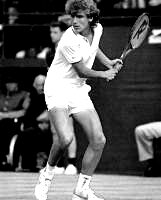 year’s Swede, Wilander. He has said he will be happy making it to the third round, but the way he beat Heinz Gunthardt in four sets (6-4, 6-3, 3-6, 6-3) leads one to believe he will go further. He has not had much work on grass, so Wilander is flirting with a kind of bastardized serve-and-volley game. His strength is still from the baseline and that is still where he will win or lose the match. Wilander was accorded Centre Court status because of the curiosity stemming from his victory at the French Open, but he steadfastly resists any comparison to that other Swede. “It’s stupid,” he said, “to compare me with Borg. He’s one of the greatest players ever.” Perhaps the day’s best match was on Court Two, which has often been the site of upsets, many due to bad bounces on the lumpy grass. The grass was a little soft yesterday, but it was Stan Smith’s spirit that knocked off Gomez, not some lucky bounces. “I was kind of mentally tired and frustrated by the end of the match,” he said. “I was not looking forward to a fifth set. It was one of those matches where I just decided to fight hard out there – gut it out – because I wasn’t going to win on just skill.” Smith who is celebrating the 10th anniversary of his only Wimbledon singles title in 1972, is playing in only his third Grand Prix Tournament since his elbow was operated on Nov. 17. He picked a good time for his first singles win. Gomez is perhaps Ecuador’s greatest player since Pancho Segura. At home on clay, Gomez decided to play Wimbledon a week ago and did not get much practice on grass. “In five years I will learn,” he said. Leading two sets to love, Smith’s serve faltered and while serving for the match at 5:4 in the third, Gomez came up with three outright winners to take the game. In the fourth set, Smith was up a break at 4:2 but not serving well. Gomez got the break back for 4:4. In the 12th game, Smith served a bit better and saved two set points against him. You could see his shoulders sag with relief when it went to a tie-breaker. Again Smith lived dangerously, giving Gomez two set points in sudden death, but Gomez made two errors to square it at 6:6. Smith made a brilliant service return to get his first match point. His next serve kicked in on Gomez, who twisted around to backhand it. The ball went flying over the net to a charging Smith, who, luckily for him, stumbled and fell under the ball, which passed over the baseline. It was a tough way to win. Chip Hooper, who burst into tennis prominence five months ago at the Pro Indoor in Philadelphia, yesterday became the toast of Wimbledon with a scintillating upset of eighth-seeded Peter McNamara, 7-6, 3-6, 6-2, 6-4. The Court One thriller marked Hooper’s debut at Wimbledon and only his fifth pro match ever on grass. “Wimbledon is such a big thing,” an elated Hooper said afterward. ”It’s kind of like a big picture show. At other places, I’ve always felt like I was playing tennis tournaments. But here… this is like playing on a different planet.” The unfortunate McNamara might well agree, for many of the 6-foot-6 Hooper’s serves had an interplanetary look about them as they traveled at light speed into the grass. Hooper said it best: “When my big serve was working – boom – he was fighting for life to get them back.” At times Hooper’s serve seemed a real menace to life and limb, as the baseline officials dodged his bullets. When they rotated in a new crew, someone remarked, “They’re bringing in linesmen who don’t have families.” Hooper’s booming serve – which has been clocked at 135 m.p.h. – and his generally consistent net play overwhelmed the error-prone McNamara, an Australian who is ranked 13th in the world. Serving at 4:1 in the fourth set, Hooper remembered where he was playing and his nerves got rattled, allowing McNamara to break his serve twice and draw even. But the big American broke back for 5:4 and served out the match at 30, leaping high into the air to crash down a desperate final lob from McNamara. Hooper smashed a ball into the stands in triumph. “It was a great match,” said the victor, who is ranked 23d in the world. “I haven’t really accepted the fact that I’m playing Wimbledon – but maybe I will after three or four beers.” Ilie Nastase packed them into No. 2 court for his first round match. Unshaven for several days, he looked mean and menacing, but 23-year-old American Lloyd Bourne swept him efficiently aside 6-1, 6-3, 3-6, 6-4. Brian Teacher came back from a 0:5 deficit in the tie-break ousting Shlomo Glickstein 3-6, 7-6(7), 6-4, 4-6, 6-2.
year’s Swede, Wilander. He has said he will be happy making it to the third round, but the way he beat Heinz Gunthardt in four sets (6-4, 6-3, 3-6, 6-3) leads one to believe he will go further. He has not had much work on grass, so Wilander is flirting with a kind of bastardized serve-and-volley game. His strength is still from the baseline and that is still where he will win or lose the match. Wilander was accorded Centre Court status because of the curiosity stemming from his victory at the French Open, but he steadfastly resists any comparison to that other Swede. “It’s stupid,” he said, “to compare me with Borg. He’s one of the greatest players ever.” Perhaps the day’s best match was on Court Two, which has often been the site of upsets, many due to bad bounces on the lumpy grass. The grass was a little soft yesterday, but it was Stan Smith’s spirit that knocked off Gomez, not some lucky bounces. “I was kind of mentally tired and frustrated by the end of the match,” he said. “I was not looking forward to a fifth set. It was one of those matches where I just decided to fight hard out there – gut it out – because I wasn’t going to win on just skill.” Smith who is celebrating the 10th anniversary of his only Wimbledon singles title in 1972, is playing in only his third Grand Prix Tournament since his elbow was operated on Nov. 17. He picked a good time for his first singles win. Gomez is perhaps Ecuador’s greatest player since Pancho Segura. At home on clay, Gomez decided to play Wimbledon a week ago and did not get much practice on grass. “In five years I will learn,” he said. Leading two sets to love, Smith’s serve faltered and while serving for the match at 5:4 in the third, Gomez came up with three outright winners to take the game. In the fourth set, Smith was up a break at 4:2 but not serving well. Gomez got the break back for 4:4. In the 12th game, Smith served a bit better and saved two set points against him. You could see his shoulders sag with relief when it went to a tie-breaker. Again Smith lived dangerously, giving Gomez two set points in sudden death, but Gomez made two errors to square it at 6:6. Smith made a brilliant service return to get his first match point. His next serve kicked in on Gomez, who twisted around to backhand it. The ball went flying over the net to a charging Smith, who, luckily for him, stumbled and fell under the ball, which passed over the baseline. It was a tough way to win. Chip Hooper, who burst into tennis prominence five months ago at the Pro Indoor in Philadelphia, yesterday became the toast of Wimbledon with a scintillating upset of eighth-seeded Peter McNamara, 7-6, 3-6, 6-2, 6-4. The Court One thriller marked Hooper’s debut at Wimbledon and only his fifth pro match ever on grass. “Wimbledon is such a big thing,” an elated Hooper said afterward. ”It’s kind of like a big picture show. At other places, I’ve always felt like I was playing tennis tournaments. But here… this is like playing on a different planet.” The unfortunate McNamara might well agree, for many of the 6-foot-6 Hooper’s serves had an interplanetary look about them as they traveled at light speed into the grass. Hooper said it best: “When my big serve was working – boom – he was fighting for life to get them back.” At times Hooper’s serve seemed a real menace to life and limb, as the baseline officials dodged his bullets. When they rotated in a new crew, someone remarked, “They’re bringing in linesmen who don’t have families.” Hooper’s booming serve – which has been clocked at 135 m.p.h. – and his generally consistent net play overwhelmed the error-prone McNamara, an Australian who is ranked 13th in the world. Serving at 4:1 in the fourth set, Hooper remembered where he was playing and his nerves got rattled, allowing McNamara to break his serve twice and draw even. But the big American broke back for 5:4 and served out the match at 30, leaping high into the air to crash down a desperate final lob from McNamara. Hooper smashed a ball into the stands in triumph. “It was a great match,” said the victor, who is ranked 23d in the world. “I haven’t really accepted the fact that I’m playing Wimbledon – but maybe I will after three or four beers.” Ilie Nastase packed them into No. 2 court for his first round match. Unshaven for several days, he looked mean and menacing, but 23-year-old American Lloyd Bourne swept him efficiently aside 6-1, 6-3, 3-6, 6-4. Brian Teacher came back from a 0:5 deficit in the tie-break ousting Shlomo Glickstein 3-6, 7-6(7), 6-4, 4-6, 6-2.
Second round: Steve Goldstein
Perhaps they intended to give John McEnroe a head start on the rest of the field, hoping he would lose and go away. Whatever the reason, McEnroe advanced to the third round of the Wimbledon tennis championships yesterday, with 32 men yet to strike a ball that mattered. The defending champion defeated South Africa’s Eddie Edwards, 6-3, 6-3, 7-5, on yet another day where rain forced an abbreviated program. Most of the matches between unseeded women were completed, but the women’s seeds and nearly one-fourth of the men have yet to play. It seems inevitable that the tournament committee will be forced to start play on some days before the hallowed time of 2 p.m. “For my first Wimbledon, it was pretty awe-inspiring to play on grass against Nastase on Court 2,” Lloyd Bourne said after a 6-4, 6-4, 1-6, 5-7, 6-3 win over Cassio Motta. “I had a slight attack of nerves, but this was one of my best days so far, and I have no complaints.” Looming in Bourne’s future is McEnroe, who did not have a good day against Edwards with either his tennis or his temper. Despite 13 aces – six on game points – the No. 1 seed served erratically and made an  inordinate number of volleying errors. “I’m probably lucky to win, and Eddie didn’t play that well,” McEnroe said of the two-hour match. “I was frustrated the way I played today.” When McEnroe is frustrated he often takes it out on others, and umpire George Armstrong was the victim yesterday. McEnroe had several squabbles with Armstrong. None was serious, although he did receive his first conduct warning of the tournament. The warning was for “Abuse of Ball,” and came after McEnroe had opened the third game of the final set by netting an easy volley. The volatile New Yorker slammed a ball into the net in disgust, and it skipped over the net cord to the other side. “Code violation. Warning, Mr. McEnroe. Abuse of Ball,” intoned Armstrong. Blimey if Jimmy Connors isn’t actually laughing. Enfant terrible turns pere adorable, as we continental types say. From baby brawler to congenial daddy hardly constitutes a unique journey for any part of mankind. The world is full of snarling punks ultimately becalmed by fatherhood. But nobody ever figured it would happen to a kid who in his howling heyday made John McEnroe’s act look almost Sunday-schoolish. The ex-tough from still-tough Belleville, Ill., really must want his first Gentleman’s Singles championship at Wimbledon since 1974, when he qualified for the trophy if not the description. Connors came out for his second-round match Thursday with a fresh serve and pearly-whites showing ear-to-ear. When Centre Court’s crowd exploded in applause, Patti’s husband and two- year-old Brett’s dad not only bowed, but broke out with a huge smile. When 6-3 opponent John Alexander draped an arm over Connors’ shoulders to accommodate photographers, Connors, only 5-10, playfully strained upward on tiptoe. And when his 6-4, 4-6, 6-1, 7-6 triumph finally was history, he yukked it up in the press-room. “How do you compare yourself with ’74?” he was asked. “You mean that that was my peak and everything else has been a valley?” he said, and burst out laughing. This is the 29-year-old version of the blustering youth with a wharf-rat’s survival instincts. It is true that Connors had every reason to think he could relax against Alexander, 30. He had lost only one of 24 sets to the Australian in 10 matches, including a ’78 Wimbledon fourth- rounder. The explosive Chip Hooper lost to New Zealander Russell Simpson 6-3, 1-6, 6-3, 6-7, 11-9 of a match that had been halted by darkness after four sets on Saturday. And Brian Gottfried lost to unheralded Nick Saviano 6-7, 6-7, 7-5, 6-4, 6-1 in a match carried over from Thursday. Gottfried was up, two sets to none and 5:2, on Thursday, then proceeded to lose five straight games before play was stopped. Yesterday, Saviano finished off the amazing comeback by taking the last two sets. Gottfried, seeded No. 13, was the only seeded player to fall yesterday. It was 6th and last Grand Slam defeat for Gottfried despite a two-sets-to-love advantage (it’s a record when I write it during Roland Garros ’13). Hooper just missed being seeded here, and he was playing a man ranked only No. 89 by the Association of Tennis Professionals’ computer and who lost to him two weeks ago in another grass-court tournament. Yesterday, they played even to 9:9 in the fifth, each serving and volleying well. Simpson held serve for 10:9, but Hooper missed two volleys from 30/15 to give Simpson a match point, then followed with a third volley error to end his Wimbledon. ‘‘I missed three volleys in one game, that’s all there is to it,” Hooper said. “It’s disgusting.” Hooper said that he expected to get to “the semis, finals or win. This is not what I expected. I knew I could do well here and didn’t.” Vitas Gerulaitis rallied from a shaky start for a 7-5, 6-2, 6-3 victory over Bruce Derlin of New Zealand; Johan Kriek fought back from the brink of elimination to beat Peter Elter of West Germany, 4-6, 6-3, 3-6, 6-0, 6-4; and Christopher Mottram, the last British entry in either singles, defeated Victor Amaya, 6-4, 5-7, 6-4, 6-4. Hank Pfister ousted Stan Smith, the 1972 champion, 6-4, 7-6, 7-6.
inordinate number of volleying errors. “I’m probably lucky to win, and Eddie didn’t play that well,” McEnroe said of the two-hour match. “I was frustrated the way I played today.” When McEnroe is frustrated he often takes it out on others, and umpire George Armstrong was the victim yesterday. McEnroe had several squabbles with Armstrong. None was serious, although he did receive his first conduct warning of the tournament. The warning was for “Abuse of Ball,” and came after McEnroe had opened the third game of the final set by netting an easy volley. The volatile New Yorker slammed a ball into the net in disgust, and it skipped over the net cord to the other side. “Code violation. Warning, Mr. McEnroe. Abuse of Ball,” intoned Armstrong. Blimey if Jimmy Connors isn’t actually laughing. Enfant terrible turns pere adorable, as we continental types say. From baby brawler to congenial daddy hardly constitutes a unique journey for any part of mankind. The world is full of snarling punks ultimately becalmed by fatherhood. But nobody ever figured it would happen to a kid who in his howling heyday made John McEnroe’s act look almost Sunday-schoolish. The ex-tough from still-tough Belleville, Ill., really must want his first Gentleman’s Singles championship at Wimbledon since 1974, when he qualified for the trophy if not the description. Connors came out for his second-round match Thursday with a fresh serve and pearly-whites showing ear-to-ear. When Centre Court’s crowd exploded in applause, Patti’s husband and two- year-old Brett’s dad not only bowed, but broke out with a huge smile. When 6-3 opponent John Alexander draped an arm over Connors’ shoulders to accommodate photographers, Connors, only 5-10, playfully strained upward on tiptoe. And when his 6-4, 4-6, 6-1, 7-6 triumph finally was history, he yukked it up in the press-room. “How do you compare yourself with ’74?” he was asked. “You mean that that was my peak and everything else has been a valley?” he said, and burst out laughing. This is the 29-year-old version of the blustering youth with a wharf-rat’s survival instincts. It is true that Connors had every reason to think he could relax against Alexander, 30. He had lost only one of 24 sets to the Australian in 10 matches, including a ’78 Wimbledon fourth- rounder. The explosive Chip Hooper lost to New Zealander Russell Simpson 6-3, 1-6, 6-3, 6-7, 11-9 of a match that had been halted by darkness after four sets on Saturday. And Brian Gottfried lost to unheralded Nick Saviano 6-7, 6-7, 7-5, 6-4, 6-1 in a match carried over from Thursday. Gottfried was up, two sets to none and 5:2, on Thursday, then proceeded to lose five straight games before play was stopped. Yesterday, Saviano finished off the amazing comeback by taking the last two sets. Gottfried, seeded No. 13, was the only seeded player to fall yesterday. It was 6th and last Grand Slam defeat for Gottfried despite a two-sets-to-love advantage (it’s a record when I write it during Roland Garros ’13). Hooper just missed being seeded here, and he was playing a man ranked only No. 89 by the Association of Tennis Professionals’ computer and who lost to him two weeks ago in another grass-court tournament. Yesterday, they played even to 9:9 in the fifth, each serving and volleying well. Simpson held serve for 10:9, but Hooper missed two volleys from 30/15 to give Simpson a match point, then followed with a third volley error to end his Wimbledon. ‘‘I missed three volleys in one game, that’s all there is to it,” Hooper said. “It’s disgusting.” Hooper said that he expected to get to “the semis, finals or win. This is not what I expected. I knew I could do well here and didn’t.” Vitas Gerulaitis rallied from a shaky start for a 7-5, 6-2, 6-3 victory over Bruce Derlin of New Zealand; Johan Kriek fought back from the brink of elimination to beat Peter Elter of West Germany, 4-6, 6-3, 3-6, 6-0, 6-4; and Christopher Mottram, the last British entry in either singles, defeated Victor Amaya, 6-4, 5-7, 6-4, 6-4. Hank Pfister ousted Stan Smith, the 1972 champion, 6-4, 7-6, 7-6.
Third round: Steve Goldstein
In the fading light of an English summer evening, Jimmy Connors yesterday ended the dream of an unknown from California who deemed it an honor merely to be on the court with him. It will be recorded that at 9:28 p.m. yesterday, after slightly more than three hours of play, Connors, the No. 2 seed, defeated Drew Gitlin, a qualifier playing in his first Wimbledon, by the scores of 6-2, 6-7, 7-5, 7-5. What won’t show on the score sheet is the heart showed by Gitlin in front of 7,000 spectators on Court No. 1. “What a trip!” said Gitlin, who, though disappointed he had lost, was confident that he had given it his all. “I’m nervous. Pleased. I guess any athlete always feels he can win. If you don’t, you shouldn’t be out there.” Gitlin, 24, turned pro last October, after making the semifinals of the NCAA championships in his senior year at Southern Methodist. He has struggled in his first year on the tour, drawing seeded players in the first round nearly everywhere. Yesterday, he proved he belongs. “My parents are here,” Gitlin said, “and I think I made them believers, too. I think they’re in shock.” Connors, who was off his game, played heroically himself. He saved three break points in the 11th game of the third set. Had any one of them gone the other way, Gitlin would have been serving for the set. Connors also played well on the big points in the fourth set. “I was just more or less going on instinct,” he said, referring to the deepening twilight. “The last few games were pretty rough. I could see the scoreboard, but that’s about it. That’s what I was going on.” In victory, Connors could afford to say that the match had given him much-needed practice after three days without competition. He admitted that he had played poorly – rendering his opinion by holding his nose – but he said that the tough match would serve him well later in the tournament. Neither player wanted to see the match suspended, even though play had stopped elsewhere on the grounds of the All England Club. Perhaps Connors had noted the surprising results of two suspended matches completed yesterday. The men just about completed the final 16 with all the remaining seeds getting through. Vitas Gerulaitis, the third seed, provided some anxious moments as he rallied from two sets down to defeat Thomas Smid of Czechoslovakia 6-7, 3-6, 6-3, 6-4, 6-2. Gerulaitis’ next test will come today against Roscoe Tanner, who turned back Vijay Amritraj in the fifth set after the Indian had come back from two sets down. The Tanner-Amritraj match earned the greatest applause of this tournament because of the quality of 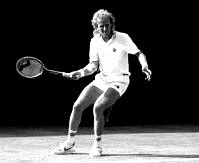 play and the good sportsmanship. Tanner summed up the crowd’s response. “Vijay and I are competing,” Tanner said, “But we enjoy what we’re doing.” “Last year I just wanted to win a match here,” said Gerulaitis. “This year, I’d like to do a bit better.” Sandy Mayer had an uneasy feeling when he noticed that Tim Mayotte was in his quarter of the draw. It was Mayotte, after all, who put the favored Mayer out of Wimbledon in 1981. This year looked to be different. At least from the crest of a two-sets- to-love, 4:3 wave that the fourth-seeded Mayer was riding yesterday. But the law of gravity and Mayotte’s inspired play pulled him down, and Mayer dropped the next five games and, eventually, the match. “I started a little tight,” Mayotte said of his 3-6, 6-7, 6-4, 6-2, 6-4 victory, “but it was just a matter of loosening up and having the courage to go for the shots.” Mayotte’s triumph thrust the Massachusetts native into the final 16, where he has a date with England’s Buster Mottram. Mayotte made a few volley errors in the first set that gave Mayer the only service break he needed. In the second, Mayer simply outplayed his opponent in the tie-breaker. By now, Mayotte decided he wasn’t being bold enough and began hitting out – “going for the lines,” as he said. Aggressive play enabled him to win the third and fourth sets. In the fifth he broke Mayer’s serve at 4:4, and that decided the match. Russell Simpson won third match in a row in five-setters as he ousted Marcos Hocevar 3-6, 5-7, 6-3, 7-6, 6-3.
play and the good sportsmanship. Tanner summed up the crowd’s response. “Vijay and I are competing,” Tanner said, “But we enjoy what we’re doing.” “Last year I just wanted to win a match here,” said Gerulaitis. “This year, I’d like to do a bit better.” Sandy Mayer had an uneasy feeling when he noticed that Tim Mayotte was in his quarter of the draw. It was Mayotte, after all, who put the favored Mayer out of Wimbledon in 1981. This year looked to be different. At least from the crest of a two-sets- to-love, 4:3 wave that the fourth-seeded Mayer was riding yesterday. But the law of gravity and Mayotte’s inspired play pulled him down, and Mayer dropped the next five games and, eventually, the match. “I started a little tight,” Mayotte said of his 3-6, 6-7, 6-4, 6-2, 6-4 victory, “but it was just a matter of loosening up and having the courage to go for the shots.” Mayotte’s triumph thrust the Massachusetts native into the final 16, where he has a date with England’s Buster Mottram. Mayotte made a few volley errors in the first set that gave Mayer the only service break he needed. In the second, Mayer simply outplayed his opponent in the tie-breaker. By now, Mayotte decided he wasn’t being bold enough and began hitting out – “going for the lines,” as he said. Aggressive play enabled him to win the third and fourth sets. In the fifth he broke Mayer’s serve at 4:4, and that decided the match. Russell Simpson won third match in a row in five-setters as he ousted Marcos Hocevar 3-6, 5-7, 6-3, 7-6, 6-3.
Fourth round: Steve Goldstein
John McEnroe scored a 6-4, 6-4, 6-4 win over Hank Pfister and will meet Johan Kriek, a straight-set winner over Nick Saviano. That was not the end of McEnroe ‘s troubles. He got another warning in a second-round doubles match when he and Peter Fleming barely hung on, saving three match points at 4:5 in the third set, to edge Rod Frawley of Australia and Chris Lewis of New Zealand, 7-6, 3-6, 8-6. Both McEnroe and Pfister received conduct warnings in their ill-tempered match, and McEnroe got another warning in his doubles match later in the day. Jimmy Connors and Vitas Gerulaitis, the second and third seeds, each had exceptionally easy matches. Connors lost only six games in ousting Paul McNamee and now must play Gene Mayer, a winner in six straight sets over Steve Denton. Gerulaitis rolled over Roscoe Tanner, 6-3, 6-4, 6-3, and moves on to an encounter with Mark Edmondson, who finally proved that Russell Simpson could be beaten, so long as you don’t go to five sets. Gerulaitis served particularly well – Tanner didn’t break his serve once. The New Yorker is keen to win here, and said that he doesn’t need any special stimulation other than the amount of money that accrues to the winners of big tournaments. “(Mats) Wilander made himself a millionaire by winning the French (Open),” said Gerulaitis. “You don’t need to be a Rhodes scholar 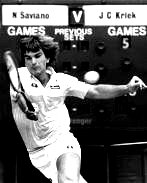 to work that one out.” So much for the prestige of a grand-slam event. Connors crushed Paul McNamee of Australia, 6-2, 6-3, 6-1. Gene Mayer eliminated No. 16 Steve Denton, 6-3, 6-4, 6-4; Johan Kriek downed Nick Saviano, 6-2, 6-3, 7-5; and Edmondson edged New Zealand’s Russell Simpson, 6-4, 7-6, 7-6. Unseeded Tim Mayotte, 1981 NCAA champion from Springfield, Mass., moved into the quarterfinals with a 6-2, 7-5, 6-3 victory over Buster Mottram, the 15th seed and the last hope of the British fans. Mayotte reached the quarterfinals for the second time. He had just turned pro when he played at Wimbledon in 1981. He led Mottram, 6-2, 2:1, when rain interrupted play. When it was resumed, Mayette lost his touch and Mottram took a 4:2 lead. But then Mayotte got his game together, and once he had nosed ahead, he stayed in control. “It’s great to have another shot at the quarterfinals,” said Mayotte, who won the NCAA while at Stanford. “Last year I didn’t play as well as I could because I was nervous. Now I feel extremely comfortable on grass.” Mats Wilander, a favorite with the crowd after his triumph in the French Open last month, failed to find a way to get past Brian Teacher, who served consistently and used his long reach to cut off the Swede’s passing shots. Teacher ended the hopes of Sweden’s 17-year-old Swede, 6-4, 6-4, 6-3, to move into the quarters. Mayer, after losing to Connors, said conditions will favor McEnroe if he plays Connors in the final with continuing rain. “Rain makes the grass courts soft,” Mayer said. “The harder the surface, the better Connors likes it and the better he plays.”
to work that one out.” So much for the prestige of a grand-slam event. Connors crushed Paul McNamee of Australia, 6-2, 6-3, 6-1. Gene Mayer eliminated No. 16 Steve Denton, 6-3, 6-4, 6-4; Johan Kriek downed Nick Saviano, 6-2, 6-3, 7-5; and Edmondson edged New Zealand’s Russell Simpson, 6-4, 7-6, 7-6. Unseeded Tim Mayotte, 1981 NCAA champion from Springfield, Mass., moved into the quarterfinals with a 6-2, 7-5, 6-3 victory over Buster Mottram, the 15th seed and the last hope of the British fans. Mayotte reached the quarterfinals for the second time. He had just turned pro when he played at Wimbledon in 1981. He led Mottram, 6-2, 2:1, when rain interrupted play. When it was resumed, Mayette lost his touch and Mottram took a 4:2 lead. But then Mayotte got his game together, and once he had nosed ahead, he stayed in control. “It’s great to have another shot at the quarterfinals,” said Mayotte, who won the NCAA while at Stanford. “Last year I didn’t play as well as I could because I was nervous. Now I feel extremely comfortable on grass.” Mats Wilander, a favorite with the crowd after his triumph in the French Open last month, failed to find a way to get past Brian Teacher, who served consistently and used his long reach to cut off the Swede’s passing shots. Teacher ended the hopes of Sweden’s 17-year-old Swede, 6-4, 6-4, 6-3, to move into the quarters. Mayer, after losing to Connors, said conditions will favor McEnroe if he plays Connors in the final with continuing rain. “Rain makes the grass courts soft,” Mayer said. “The harder the surface, the better Connors likes it and the better he plays.”
Quarterfinals: Steve Goldstein
It rained at the All-England Tennis Championships again Thursday. But, in between the raindrops, Mark Edmondson pulled off upset to add a bit of drama to another soggy, gray day at Wimbledon. Edmondson, a burly Australian seeded 12th, ripped third- seeded Vitas Gerulaitis, 7-6(4), 3-6, 6-4, 6-3, with a battery of powerful forehands to reach the semifinals. He has been playing Wimbledon  since 1973 but never had advanced beyond the third round. Rain delayed the start of play Thursday for several hours and threatened to wreck referee Fred Hoyles’ plan to finish the tournament this Sunday as scheduled. To stay on course, he had to get at least three singles completed. The weather cleared just in time to accommodate. No. 2 Jimmy Connors sailed past Gene Mayer, 6-1, 6-2, 7-6, to qualify for a semifinal match with Edmondson. The 8/6 third-set tiebreaker finished in rapidly fading light. Edmondson, his dark scowl more fitting to a loser, complained about playing on Court 2. “The court was terrible and it was a disgrace to put us out there,” he said. “The reason a lot of seeds get beaten there is not because it’s a voodoo court. It’s just a bad court, and it’s disappointing they put one of the quarterfinals out there. It’s as if they didn’t care about us.” Whatever thoughts Gerulaitis had about Court 2 and his loss he kept to himself, since he refused to be interviewed. Edmondson, who recently said he would rather drink beer than practice, won the 1976 Australian Open as an unseeded player, a feat never before accomplished. Gerulaitis had his chance in the opening set, but blew a set point on two aces by Edmondson and then dropped the tiebreaker. Three service breaks gave Gerulaitis the second set, but then he started missing with his first serve and Edmondson attacked the second serve with success. “I concentrated on getting the ball high and as heavy as I could because the court was bad,” Edmondson said. After Gerulaitis missed two break points in the sixth game of the third set, Edmondson broke in the seventh. In the final set, Gerulaitis saved three match points on his serve before Edmondson ended the 2 1/2-hour match with a cross-court forehand. Connors, although saying he didn’t serve as well as he could, did agree that he played “extremely well” in the first two sets. He lost his concentration for a while in the third set but recovered it in time to dispose of Mayer. Looking ahead to Edmondson, to whom he has never lost, Connors said, “I played him at Queens and I played very well against him. I’ve been playing against some pretty big servers this week but my return is going well.” John McEnroe and Tim Mayotte won yesterday to advance to today’s men’s semifinals, the winner to meet the survivor of the Connors-Edmondson
since 1973 but never had advanced beyond the third round. Rain delayed the start of play Thursday for several hours and threatened to wreck referee Fred Hoyles’ plan to finish the tournament this Sunday as scheduled. To stay on course, he had to get at least three singles completed. The weather cleared just in time to accommodate. No. 2 Jimmy Connors sailed past Gene Mayer, 6-1, 6-2, 7-6, to qualify for a semifinal match with Edmondson. The 8/6 third-set tiebreaker finished in rapidly fading light. Edmondson, his dark scowl more fitting to a loser, complained about playing on Court 2. “The court was terrible and it was a disgrace to put us out there,” he said. “The reason a lot of seeds get beaten there is not because it’s a voodoo court. It’s just a bad court, and it’s disappointing they put one of the quarterfinals out there. It’s as if they didn’t care about us.” Whatever thoughts Gerulaitis had about Court 2 and his loss he kept to himself, since he refused to be interviewed. Edmondson, who recently said he would rather drink beer than practice, won the 1976 Australian Open as an unseeded player, a feat never before accomplished. Gerulaitis had his chance in the opening set, but blew a set point on two aces by Edmondson and then dropped the tiebreaker. Three service breaks gave Gerulaitis the second set, but then he started missing with his first serve and Edmondson attacked the second serve with success. “I concentrated on getting the ball high and as heavy as I could because the court was bad,” Edmondson said. After Gerulaitis missed two break points in the sixth game of the third set, Edmondson broke in the seventh. In the final set, Gerulaitis saved three match points on his serve before Edmondson ended the 2 1/2-hour match with a cross-court forehand. Connors, although saying he didn’t serve as well as he could, did agree that he played “extremely well” in the first two sets. He lost his concentration for a while in the third set but recovered it in time to dispose of Mayer. Looking ahead to Edmondson, to whom he has never lost, Connors said, “I played him at Queens and I played very well against him. I’ve been playing against some pretty big servers this week but my return is going well.” John McEnroe and Tim Mayotte won yesterday to advance to today’s men’s semifinals, the winner to meet the survivor of the Connors-Edmondson 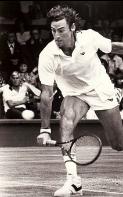 match. McEnroe overcame some inconsistent serving to triumph over Johan Kriek of South Africa, 4-6, 6-2, 7-5, 6-3. Mayotte, the unseeded Springfield rifle, waged a four-hour battle with the 11th-seeded Brian Teacher before winning, 6-7(5), 7-6(5), 7-5, 3-6, 6-1. Mayotte staged a remarkable comeback in the fifth set after playing poorly in the later stages of the fourth. From 3:3 in the fourth, Teacher held serve, broke Mayotte’s serve and held again for the set – all without dropping a point. But in the deciding set, Mayotte opened by holding serve at love, then broke Teacher as a passing shot hit the net cord and hopped over Teacher’s racket. Continuing to serve well, Mayotte added a second break in the sixth game when Teacher netted a half-volley. The New Englander quickly piled up three match points, serving at 5:1, and though he double-faulted one away, he cashed in on the second with a beautiful serve-and-volley combination. Like McEnroe, Mayotte, 21, attended Stanford and was an NCAA singles champion. Unlike McEnroe, Mayotte is calm and controlled on court. The two have never played, but Mayotte is very respectful of the defending champion’s powers, his serve in particular. Tough serve to handle ”He serves a little bit like Luis Tiant used to pitch,” Mayotte said. ”It’s coming from God-knows-where and you don’t know where it’s going.”
match. McEnroe overcame some inconsistent serving to triumph over Johan Kriek of South Africa, 4-6, 6-2, 7-5, 6-3. Mayotte, the unseeded Springfield rifle, waged a four-hour battle with the 11th-seeded Brian Teacher before winning, 6-7(5), 7-6(5), 7-5, 3-6, 6-1. Mayotte staged a remarkable comeback in the fifth set after playing poorly in the later stages of the fourth. From 3:3 in the fourth, Teacher held serve, broke Mayotte’s serve and held again for the set – all without dropping a point. But in the deciding set, Mayotte opened by holding serve at love, then broke Teacher as a passing shot hit the net cord and hopped over Teacher’s racket. Continuing to serve well, Mayotte added a second break in the sixth game when Teacher netted a half-volley. The New Englander quickly piled up three match points, serving at 5:1, and though he double-faulted one away, he cashed in on the second with a beautiful serve-and-volley combination. Like McEnroe, Mayotte, 21, attended Stanford and was an NCAA singles champion. Unlike McEnroe, Mayotte is calm and controlled on court. The two have never played, but Mayotte is very respectful of the defending champion’s powers, his serve in particular. Tough serve to handle ”He serves a little bit like Luis Tiant used to pitch,” Mayotte said. ”It’s coming from God-knows-where and you don’t know where it’s going.”
Semifinals: Steve Goldstein
Some have compared the pairing to Ali-Frazier. Others have likened it to the irresistible force meeting the immovable object. The Wimbledon men’s final is what the odds-makers – and the seedings committee – had predicted it would be. It is what the public wanted and what the players themselves await with relish: John McEnroe vs. Jimmy Connors. Hanging in the balance is a $75,000 first prize and another notch in the gun of one of these fiercest of rivals. For Connors, a victory today (TV-Channel 3, 9 a.m.) would give him a second Wimbledon title eight years after his first. For McEnroe, it would mark a successful defense of the championship that he won for the first time last year and give him a legitimate claim to the No. 1 world ranking. It would also mean at least temporary release from the pressure that he puts on himself to achieve nothing short of perfection each time he steps on the court. For these two heavyweights, yesterday’s semifinals constituted little more than a few rounds of sparring or a few licks on the heavy bag. Connors brushed aside Australia’s Mark Edmondson, 6-4, 6-3, 6-1, in 92 minutes. McEnroe, in his initial 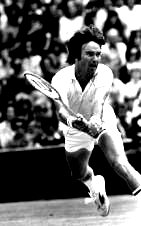 meeting with unseeded Tim Mayotte, produced all sorts of magical shots and emerged with a 6-3, 6-1, 6-2 victory in just under two hours. Connors neutralized the bear-like Edmondson’s big serve with stinging returns and passed him when he lumbered to the net. Unfortunately, the match had all of the drama of a Tupperware party. “I wanted to play the match, win and get off,” Connors said, after having done just that. Since McEnroe had never played Mayotte, there was some testing of the waters before he dove in. His strategy was to get on top of Mayotte early, to pin him to the baseline so that he could not make use of his considerable volleying skills. This, McEnroe did, and he kept Mayotte off balance throughout their Court No. 1 meeting. McEnroe got a warning for verbal obscenity in the third set. Otherwise, he was calm, although after winning the first set, he refused to continue until a damp spot resulting from the morning’s rain was sopped from the court. “I don’t think that was a belligerent move,” Mayotte said. “It was a dangerous spot. I thought,” he then joked, “that John might fall down and break his leg, and I would get into the final.” That might have been Mayotte’s only chance this year, but he may get to future finals because of his tremendous talent. Not surprisingly, both Edmondson and Mayotte said that today’s showdown hinged on how well Connors returns McEnroe ‘s serve. “There’s no use in trying to out-hit Connors,” Edmondson said. “He can return better than most people can serve.” Mayotte said that McEnroe is going to have to serve better than he did yesterday if he is to beat Connors. ”He has to get more first serves in,” Mayotte said, “or with a return like Connors has, he’ll be in trouble. It’s almost like a shark smelling blood. If a player senses a weakness, he’ll realize he can go for it. For McEnroe, the key will be keeping Jimmy in the back court, then cruising in to net himself.” Mayotte spoke wistfully of reaching the level of excellence achieved by Connors and McEnroe. ”What John or Jimmy does,” he said, “is make you work 5 percent harder on every shot.” ”For this year, it’s probably the best final,” McEnroe said in a veiled reference to the absence of Bjorn Borg. “This is the guy I can get up for the best.” The last time these two played here, in 1980, McEnroe beat Connors in the semis in an acrimonious four-setter. Connors couldn’t understand McEnroe’s habit of ranting at himself on the court. Now they are accustomed to one another’s habits, they practice together (three times during this tournament), and there is mutual admiration. “One thing that I respect about Connors,” McEnroe said, “is that he always gives 100 percent. That is one thing that makes for a good match. It should be interesting.”
meeting with unseeded Tim Mayotte, produced all sorts of magical shots and emerged with a 6-3, 6-1, 6-2 victory in just under two hours. Connors neutralized the bear-like Edmondson’s big serve with stinging returns and passed him when he lumbered to the net. Unfortunately, the match had all of the drama of a Tupperware party. “I wanted to play the match, win and get off,” Connors said, after having done just that. Since McEnroe had never played Mayotte, there was some testing of the waters before he dove in. His strategy was to get on top of Mayotte early, to pin him to the baseline so that he could not make use of his considerable volleying skills. This, McEnroe did, and he kept Mayotte off balance throughout their Court No. 1 meeting. McEnroe got a warning for verbal obscenity in the third set. Otherwise, he was calm, although after winning the first set, he refused to continue until a damp spot resulting from the morning’s rain was sopped from the court. “I don’t think that was a belligerent move,” Mayotte said. “It was a dangerous spot. I thought,” he then joked, “that John might fall down and break his leg, and I would get into the final.” That might have been Mayotte’s only chance this year, but he may get to future finals because of his tremendous talent. Not surprisingly, both Edmondson and Mayotte said that today’s showdown hinged on how well Connors returns McEnroe ‘s serve. “There’s no use in trying to out-hit Connors,” Edmondson said. “He can return better than most people can serve.” Mayotte said that McEnroe is going to have to serve better than he did yesterday if he is to beat Connors. ”He has to get more first serves in,” Mayotte said, “or with a return like Connors has, he’ll be in trouble. It’s almost like a shark smelling blood. If a player senses a weakness, he’ll realize he can go for it. For McEnroe, the key will be keeping Jimmy in the back court, then cruising in to net himself.” Mayotte spoke wistfully of reaching the level of excellence achieved by Connors and McEnroe. ”What John or Jimmy does,” he said, “is make you work 5 percent harder on every shot.” ”For this year, it’s probably the best final,” McEnroe said in a veiled reference to the absence of Bjorn Borg. “This is the guy I can get up for the best.” The last time these two played here, in 1980, McEnroe beat Connors in the semis in an acrimonious four-setter. Connors couldn’t understand McEnroe’s habit of ranting at himself on the court. Now they are accustomed to one another’s habits, they practice together (three times during this tournament), and there is mutual admiration. “One thing that I respect about Connors,” McEnroe said, “is that he always gives 100 percent. That is one thing that makes for a good match. It should be interesting.”
Final: Steve Goldstein
The longest final in Wimbledon’s 105-year history, a tension-filled drama whose outcome clearly delighted an overflow Centre Court crowd, ended yesterday with an inspired Jimmy Connors beating John McEnroe in a decisive fifth set. The two Americans lit up a gray English sky for 4 hours, 14 minutes with their own Fourth of July fireworks. For sheer emotion and the full spectrum of tennis – careless to courageous – Connors’ 3-6, 6-3, 6-7(2), 7-6(5), 6-4 triumph will be hard to beat. For Connors, 29, his second singles title proved well worth the torturous eight-year wait since his first. In 1974, Connors was the bad boy who blasted through the heroic Ken Rosewall. Yesterday, he was St. George slaying the dragon, and 14,000 fans heaped their affection and admiration on the new champion. For McEnroe, the match was one he could have won. Leading by two sets to one, the defending champion let it slip through his hands with indecisive play, uncharacteristic errors and a general malaise. The key, ironically, was McEnroe’s inability to break Connors’ serve often enough. Connors won his last 12 service games and served extremely well in the crucial fourth-set tiebreaker (3 service winners). The conventional wisdom had been that the key would be how Connors would return McEnroe’s more fearsome serve. McEnroe served well enough. He had 18 aces (his opponent none!), and Connors barely got a racket on many of his other serves. Only in the fifth set did McEnroe’s first-serve percentage dip below 50. But the difference in the fifth set – and in the match – was the New Yorker’s inability to break through Connors’ delivery. Connors served well when he had to – in the fourth-set tie-breaker and the final set. His new approach-tossing the ball forward on his serve and leaning into it – cost him 13 double faults, but all except four came in the first three sets. When the match ended, with the crowd roaring and Connors leaping and thrusting his fists in  the air, a dejected McEnroe walked to the net, shook hands and walked to the sidelines with Connors’ arm around him. Turning to Connors, he said, “It was a hell of an effort, and I’m glad that we didn’t have any problems between us.” Then Connors walked to the players’ entrance to embrace his wife, Patti. That there were no problems was in part a tribute to the umpiring of Robert Jenkins. Jenkins had handled last year’s McEnroe-Bjorn Borg final without incident, and the tournament committee decided wisely to forgo precedent and assign Jenkins to another singles final. “I thought both of them behaved reasonably well, considering how pent-up they both were,” Jenkins said. It was McEnroe ‘s conduct last year that caused the All England Club to withhold the honorary membership that it ordinarily gives to Wimbledon champions. Yesterday, following McEnroe’s defeat, the club announced that he had been elected an honorary member. Connors already had his membership, but he still had a reason to win. “I’ve had three chances to win since 1974, and I let them go by,” he said, referring to his losses in the final to Arthur Ashe once and Bjorn Borg twice. ”I was going to do anything not to let that chance slip by again.” The first set started slowly, with each player feeling the other out. McEnroe lost his serve to open the set, but a flurry of forehand errors cost Connors his serve in the sixth. McEnroe broke again in the eighth game, after
the air, a dejected McEnroe walked to the net, shook hands and walked to the sidelines with Connors’ arm around him. Turning to Connors, he said, “It was a hell of an effort, and I’m glad that we didn’t have any problems between us.” Then Connors walked to the players’ entrance to embrace his wife, Patti. That there were no problems was in part a tribute to the umpiring of Robert Jenkins. Jenkins had handled last year’s McEnroe-Bjorn Borg final without incident, and the tournament committee decided wisely to forgo precedent and assign Jenkins to another singles final. “I thought both of them behaved reasonably well, considering how pent-up they both were,” Jenkins said. It was McEnroe ‘s conduct last year that caused the All England Club to withhold the honorary membership that it ordinarily gives to Wimbledon champions. Yesterday, following McEnroe’s defeat, the club announced that he had been elected an honorary member. Connors already had his membership, but he still had a reason to win. “I’ve had three chances to win since 1974, and I let them go by,” he said, referring to his losses in the final to Arthur Ashe once and Bjorn Borg twice. ”I was going to do anything not to let that chance slip by again.” The first set started slowly, with each player feeling the other out. McEnroe lost his serve to open the set, but a flurry of forehand errors cost Connors his serve in the sixth. McEnroe broke again in the eighth game, after 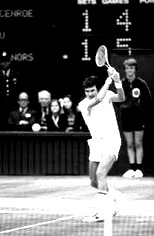 Connors had struggled back to deuce from 0/40, then held his own serve for the set. The second and third sets would not constitute this tournament’s finest hour. The second was particularly patchy, with McEnroe making an inordinate number of errors and losing his serve twice. In the third, McEnroe again lost his serve in the opening game, and Connors hung on gamely to serve for the set at 5:4. Incredibly, from 30-all, Connors served his eighth and ninth double faults, and the set was even. McEnroe played perhaps his best tennis of the match in winning the tie-breaker, aided by a couple of Connors errors and Connors’ 10th double fault. Both held serve through the fourth set to reach the second tie-breaker of the match (Connors survived the 1st game of that set after 5 deuces saving two break points). McEnroe’s 16th ace put him up, 4:3, in the tie-breaker, but Connors followed with an excellent serve, with McEnroe netting the return. Connors went ahead, 6:4, with a brilliant volley followed by a sparkling service return that McEnroe plunked into the net. McEnroe saved one set point with a serve-and-volley combination, but Connors came right back with a service winner. They were back to Square One. The match was so even that each man had won the same number of games. In the fifth set, McEnroe ‘s serve let him down in the third game. Connors took a second serve and blasted it past him on break point. Now McEnroe looked demoralized, and after Connors had held serve for 3:1, McEnroe played a loose game and nearly was broken again. On one point, he let a service return float by him, only to see it hit the baseline. He saved that break point, but he looked shaky. “It’s very hard to get pumped up when you’re down,” McEnroe said later. ”You tend to get down on yourself.” The opposite, of course, was happening to Connors. Each winning point sent him into new gyrations of ecstasy. With Connors serving at 4:3, McEnroe got to 30/15, but he was then passed twice. After McEnroe held serve, Connors was left to serve for the match at 5:4. There was nothing reserved about these English now. The church-like hushes during each point became wild cheering every time Connors moved closer to his goal. There was anticipation of a last stand by McEnroe, but the defender went out with a whimper, not a bang. First Connors volleyed out of McEnroe ‘s reach. Then McEnroe mis-hit two balls. At 40/0, Connors unloaded his 13th double fault, but it proved irrelevant rather than unlucky, for he followed with a blistering service winner. The king was dead. Long live the king. Connors knew that neither McEnroe nor he had played the best tennis of their lives, but he described it as “all-out guts play.” The victory was important to the course of Connors’ career. The title was his first in a Grand Slam event since 1978, and it went a long way toward helping him reach his stated goal of being No. 1 in the world again. “I haven’t won a major tournament since 1978, but
Connors had struggled back to deuce from 0/40, then held his own serve for the set. The second and third sets would not constitute this tournament’s finest hour. The second was particularly patchy, with McEnroe making an inordinate number of errors and losing his serve twice. In the third, McEnroe again lost his serve in the opening game, and Connors hung on gamely to serve for the set at 5:4. Incredibly, from 30-all, Connors served his eighth and ninth double faults, and the set was even. McEnroe played perhaps his best tennis of the match in winning the tie-breaker, aided by a couple of Connors errors and Connors’ 10th double fault. Both held serve through the fourth set to reach the second tie-breaker of the match (Connors survived the 1st game of that set after 5 deuces saving two break points). McEnroe’s 16th ace put him up, 4:3, in the tie-breaker, but Connors followed with an excellent serve, with McEnroe netting the return. Connors went ahead, 6:4, with a brilliant volley followed by a sparkling service return that McEnroe plunked into the net. McEnroe saved one set point with a serve-and-volley combination, but Connors came right back with a service winner. They were back to Square One. The match was so even that each man had won the same number of games. In the fifth set, McEnroe ‘s serve let him down in the third game. Connors took a second serve and blasted it past him on break point. Now McEnroe looked demoralized, and after Connors had held serve for 3:1, McEnroe played a loose game and nearly was broken again. On one point, he let a service return float by him, only to see it hit the baseline. He saved that break point, but he looked shaky. “It’s very hard to get pumped up when you’re down,” McEnroe said later. ”You tend to get down on yourself.” The opposite, of course, was happening to Connors. Each winning point sent him into new gyrations of ecstasy. With Connors serving at 4:3, McEnroe got to 30/15, but he was then passed twice. After McEnroe held serve, Connors was left to serve for the match at 5:4. There was nothing reserved about these English now. The church-like hushes during each point became wild cheering every time Connors moved closer to his goal. There was anticipation of a last stand by McEnroe, but the defender went out with a whimper, not a bang. First Connors volleyed out of McEnroe ‘s reach. Then McEnroe mis-hit two balls. At 40/0, Connors unloaded his 13th double fault, but it proved irrelevant rather than unlucky, for he followed with a blistering service winner. The king was dead. Long live the king. Connors knew that neither McEnroe nor he had played the best tennis of their lives, but he described it as “all-out guts play.” The victory was important to the course of Connors’ career. The title was his first in a Grand Slam event since 1978, and it went a long way toward helping him reach his stated goal of being No. 1 in the world again. “I haven’t won a major tournament since 1978, but  I’ve had success in that time,” Connors said. “I didn’t win a U.S. Open or a Wimbledon – which for me is a disappointment – but it doesn’t mean I failed. I won tournaments. I made a living. But it’s nice to win a Wimbledon.” The vanquished McEnroe had to undergo the further agony of playing the doubles final. It was clear that his heart wasn’t in it as he and Peter Fleming lost, 6-3, 6-2, to Australia’s Paul McNamee and Peter McNamara. Then, extremely subdued, he faced newsmen. “I feel that it was too bad I didn’t win it,” he said. “I enjoyed myself here more this year, but I would have liked a different end.” McEnroe said that he was pleased to become an All England Club member but that he would not attend the champions’ dinner later in the evening. “I think,” he said, “that the champions will be there.” Between singles and doubles, McEnroe played 13 matches in this rain-plagued tournament, the majority of them in the final hectic week. He had no complaint, but others saw it differently. “I don’t think John played quite well enough when he needed to,” said Jenkins, the umpire. “I don’t know but that his heavy schedule might have exacted its toll. He’s a great competitor, but he tends to run himself down. He rarely seems to say no.” Connors’ 94th title, 6th major. Stats of the final
I’ve had success in that time,” Connors said. “I didn’t win a U.S. Open or a Wimbledon – which for me is a disappointment – but it doesn’t mean I failed. I won tournaments. I made a living. But it’s nice to win a Wimbledon.” The vanquished McEnroe had to undergo the further agony of playing the doubles final. It was clear that his heart wasn’t in it as he and Peter Fleming lost, 6-3, 6-2, to Australia’s Paul McNamee and Peter McNamara. Then, extremely subdued, he faced newsmen. “I feel that it was too bad I didn’t win it,” he said. “I enjoyed myself here more this year, but I would have liked a different end.” McEnroe said that he was pleased to become an All England Club member but that he would not attend the champions’ dinner later in the evening. “I think,” he said, “that the champions will be there.” Between singles and doubles, McEnroe played 13 matches in this rain-plagued tournament, the majority of them in the final hectic week. He had no complaint, but others saw it differently. “I don’t think John played quite well enough when he needed to,” said Jenkins, the umpire. “I don’t know but that his heavy schedule might have exacted its toll. He’s a great competitor, but he tends to run himself down. He rarely seems to say no.” Connors’ 94th title, 6th major. Stats of the final
*************************

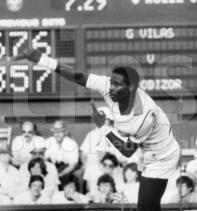
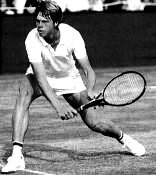
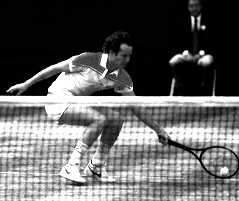
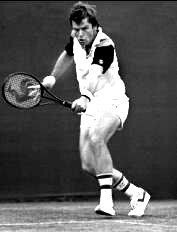

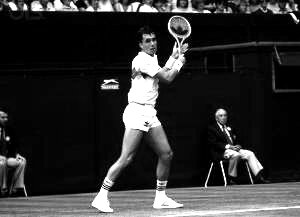
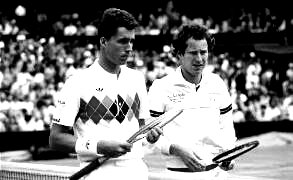
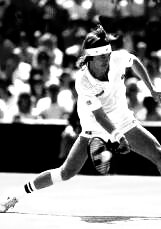
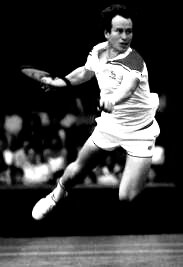

YT films:
1982
Connors vs. McEnroe – http://www.youtube.com/watch?v=2YjomkT5E4A (Spanish)
1983
Lewis vs. Curren – http://www.youtube.com/watch?v=Xbq16-LQets (last two games)
McEnroe vs. Lendl – http://www.youtube.com/watch?v=RAkr4VcbPck
McEnroe vs. Lewis – http://www.youtube.com/watch?v=-EgQkBK8n00